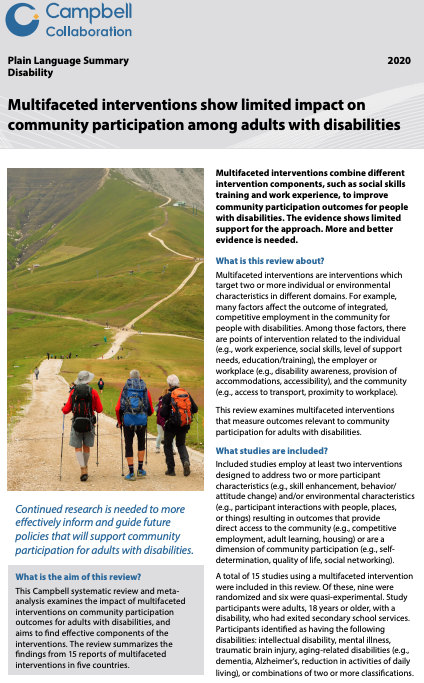
#KTDRR20—Registration is Now Open
|
 |
Learn more about the Community of Practice on Evidence for Disability and Rehabilitation Research CoP-EDR. For more information, contact Joann Starks. |
Review: Multifaceted Interventions for Supporting Community Participation Among Adults With Disabilities

In June 2020, the Campbell Collaboration published Multifaceted Interventions for Supporting Community Participation Among Adults With Disabilities: A Systematic Review. Funded by NIDILRR, the systematic review examines the impact of multifaceted interventions on community participation outcomes for adults with disabilities and focuses on identifying effective components of the interventions. The review summarizes findings from 15 reports of multifaceted interventions in five countries. The systematic review is a product of the RTC/PICL (NIDILRR grant 90RT5043) and was supported with technical assistance from KTDRR (NIDILRR grants 90DP0027, 90DPKT001).
Multifaceted interventions are interventions that target two or more individual or environmental characteristics in different domains. For example, many factors affect the outcome of integrated, competitive employment in the community for people with disabilities. Among those factors, points of intervention are related to the individual (e.g., work experience, social skills, level of support needs, education/training), the employer or workplace (e.g., disability awareness, provision of accommodations, accessibility), and the community (e.g., access to transportation, proximity to workplace).
Individual studies of multifaceted interventions show evidence of positive effects for some outcomes (employment, quality of life, and adult learning). However, there are no significant effects on other outcomes (activities of daily living, mental health, autonomy, independent living, social skills, community activities, and housing). The evidence supporting multifaceted interventions is hampered by a lack of design quality in the studies and by the small number of studies represented in each multifaceted intervention and its associated outcomes.
Citation: Gross, J. M. S., Monroe-Gulick, A., Nye, C., Davidson-Gibbs, D., & Dedrick, D. (2020). Multifaceted interventions for supporting community participation among adults with disabilities: A systematic review. Campbell Systematic Reviews, 16(2), e1092. Retrieved from https://onlinelibrary.wiley.com/doi/full/10.1002/cl2.1092
Plain Language Summary: https://campbellcollaboration.org/better-evidence/community-participation-adults-with-disabilities.html
Connect With KTDRR’s Policy Portal
Would you like your research to inform disability advocacy and policymaking? KTDRR is working to facilitate connections between NIDILRR-funded researchers and consumer organizations that advocate for people with disabilities. To do so, our website hosts a Policy Portal, a directory of consumer organizations that are well-positioned to promote research findings in their advocacy work. The Policy Portal is designed to support NIDILRR grantees in their outreach to consumer organizations.
This year, we collaborated with the National Council on Independent Living (NCIL) to expand and improve the Policy Portal. With NCIL’s help, we surveyed consumer organizations on their policy priorities and the tools they need to apply research to practice.
We are now curating lists of NIDILRR-funded research that relate to the organizations’ policy priorities to spur evidence-based advocacy. Soon, we will connect research authors to these organizations to foster strong and mutually beneficial relationships.
If you are an NIDILRR grantee or a director of a consumer organization and would like to become involved with this activity, contact KTDRR today!

|
|
The contents of this newsletter were developed under grant number 90DPKT0001 from the National Institute on Disability, Independent Living, and Rehabilitation Research (NIDILRR). NIDILRR is a Center within the Administration for Community Living (ACL), Department of Health and Human Services (HHS). The contents of this newsletter do not necessarily represent the policy of NIDILRR, ACL, HHS, and you should not assume endorsement by the Federal Government. Copyright © 2020 by American Institutes for Research |



 Join KTDRR on Wednesday, September 2, for our latest webcast. Dr. Travis Sztainert will present a prerecorded webinar,
“Testing the Waters Before Diving In: Determining the Type of Knowledge Gap and the Readiness of Knowledge to Fill It.”
Dr. Sztainert will discuss the processes that support and promote knowledge translation. He will focus on examining the
knowledge-to-action gap by introducing overarching micro-gaps and will discuss the creation of a gap assessment tool. In addition,
Dr. Sztainert will present an end-of-grant readiness tool he has been developing for several years and will describe partnership activities
around the tool’s use. For more information, visit
Join KTDRR on Wednesday, September 2, for our latest webcast. Dr. Travis Sztainert will present a prerecorded webinar,
“Testing the Waters Before Diving In: Determining the Type of Knowledge Gap and the Readiness of Knowledge to Fill It.”
Dr. Sztainert will discuss the processes that support and promote knowledge translation. He will focus on examining the
knowledge-to-action gap by introducing overarching micro-gaps and will discuss the creation of a gap assessment tool. In addition,
Dr. Sztainert will present an end-of-grant readiness tool he has been developing for several years and will describe partnership activities
around the tool’s use. For more information, visit